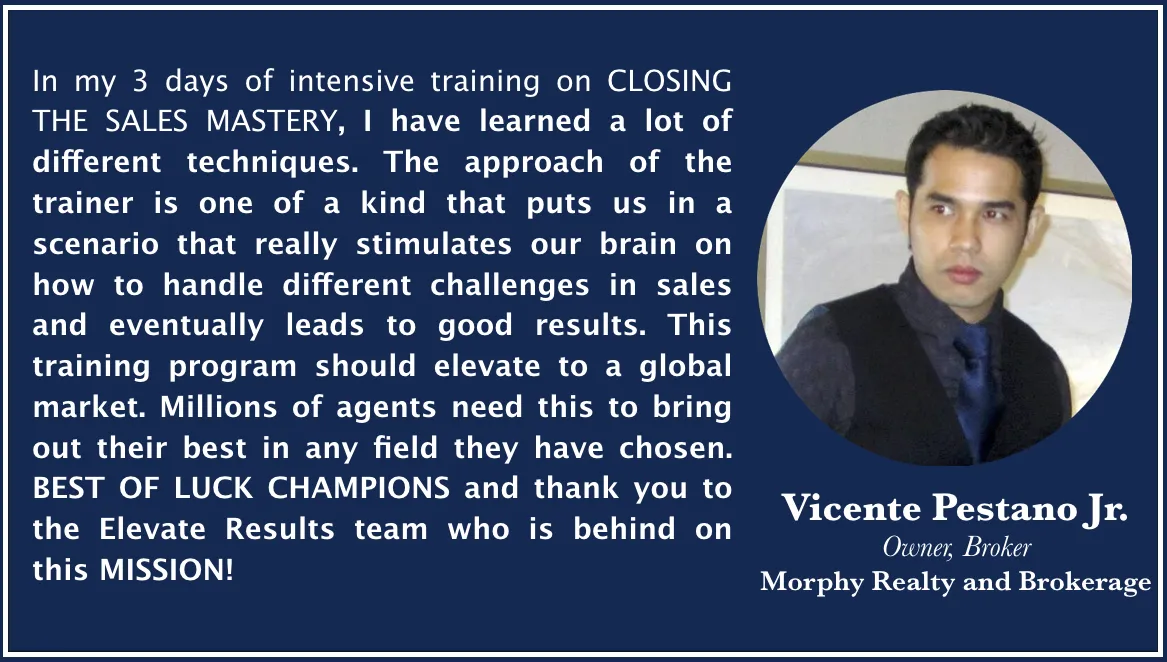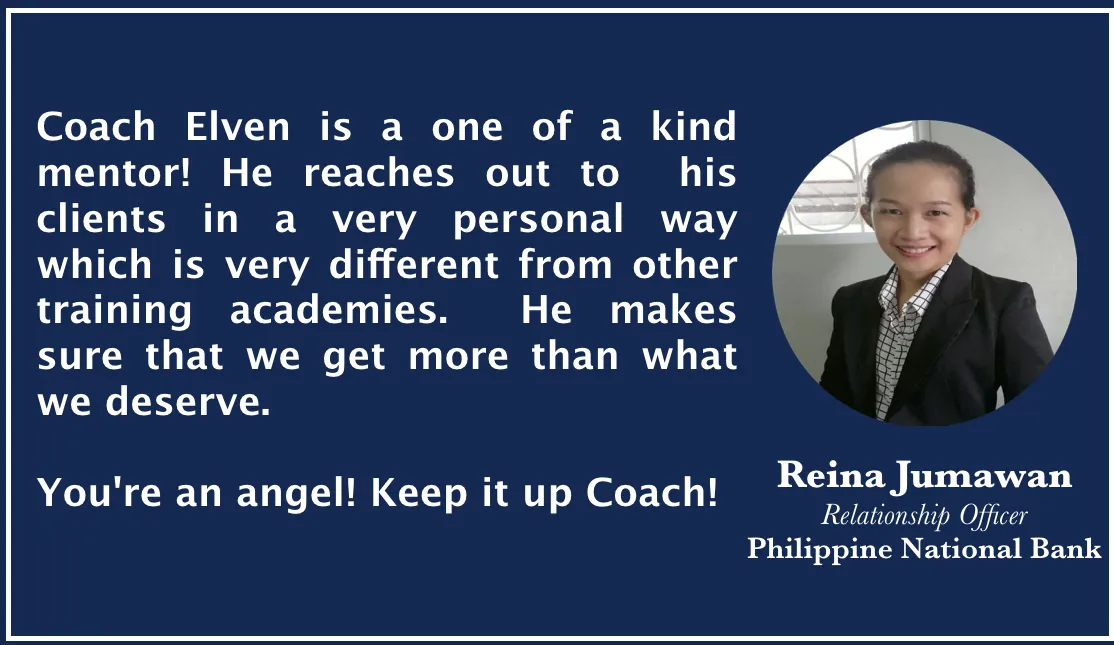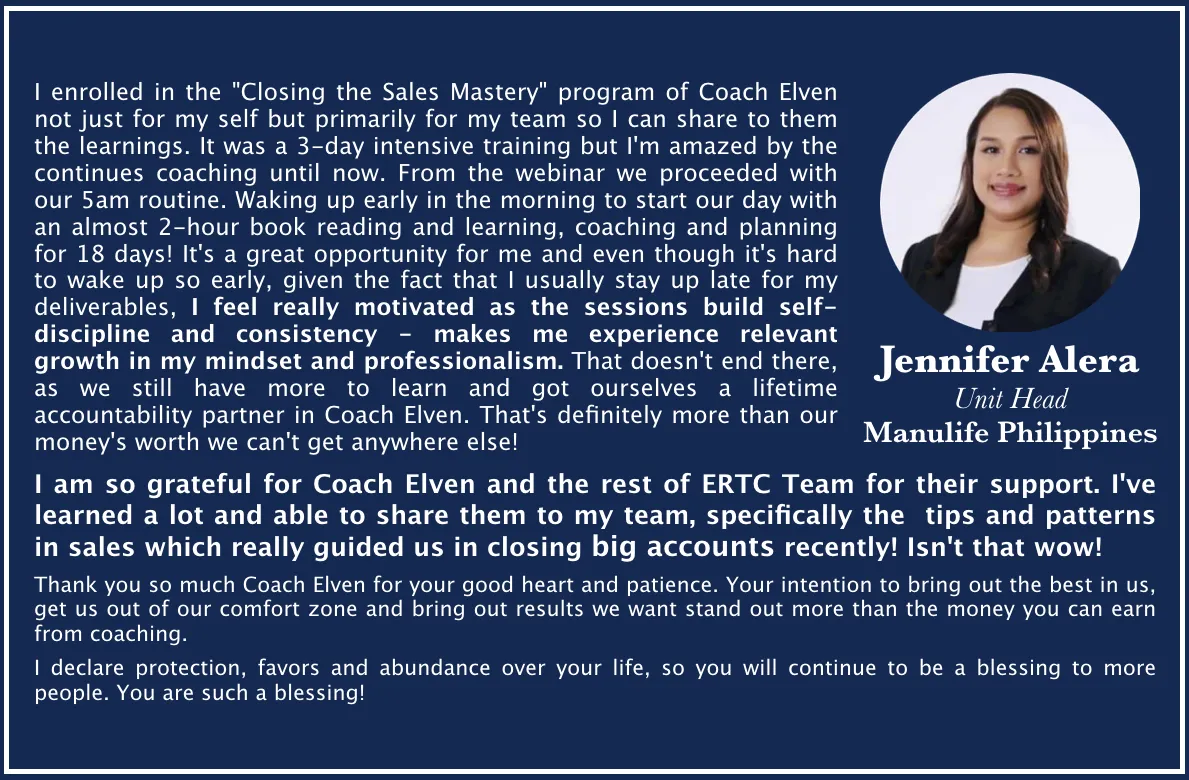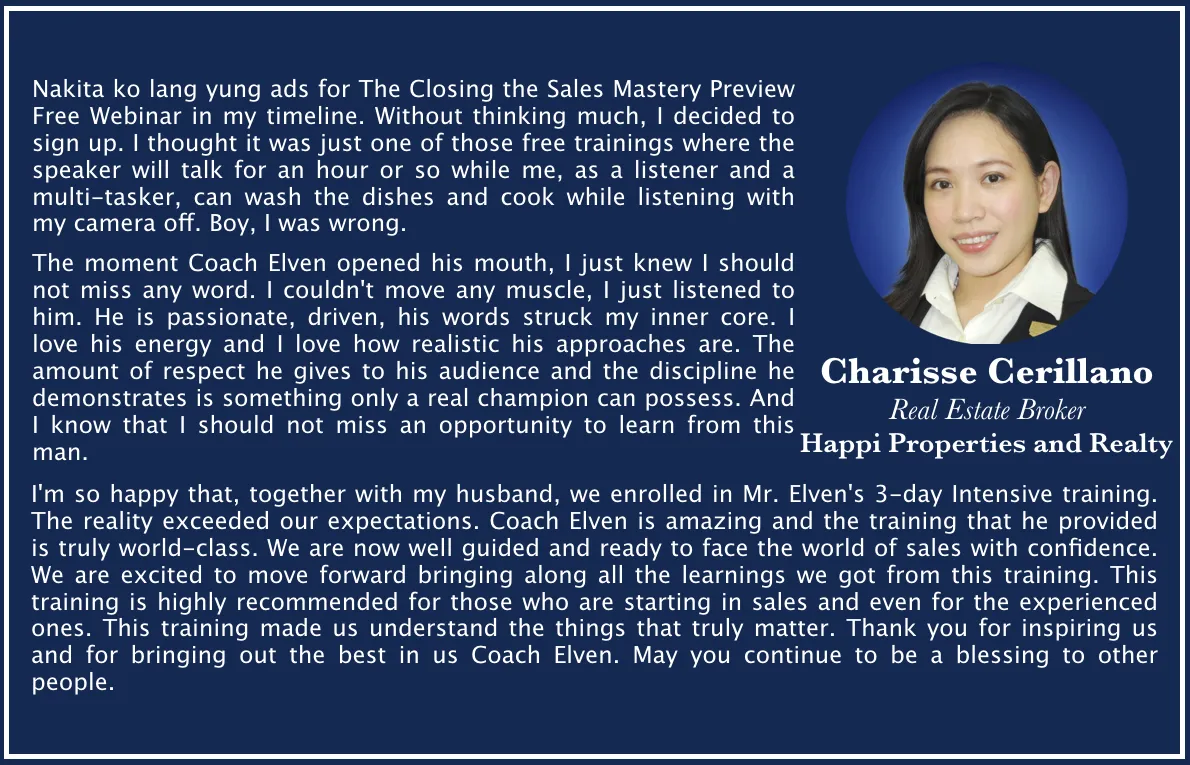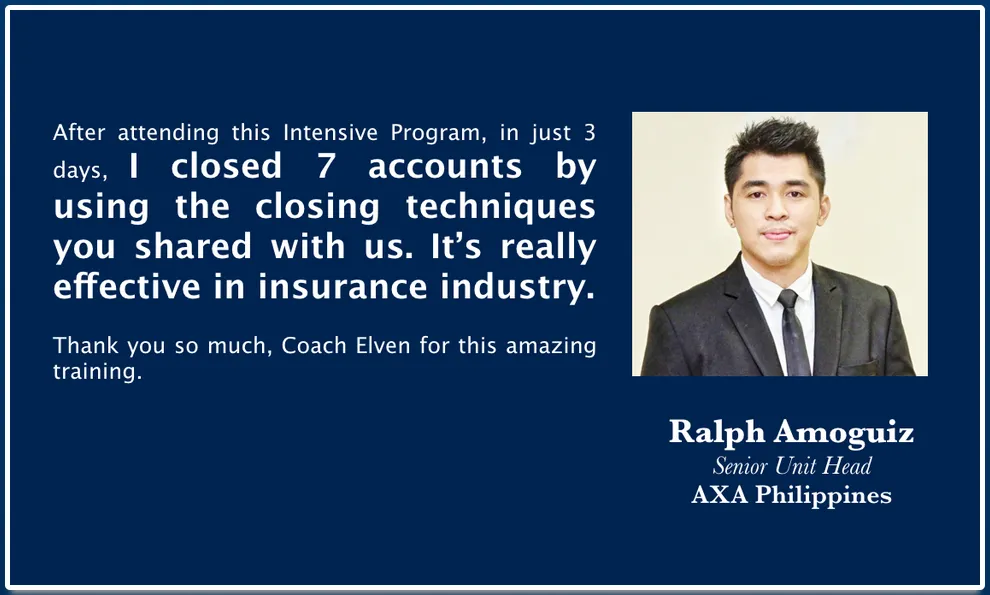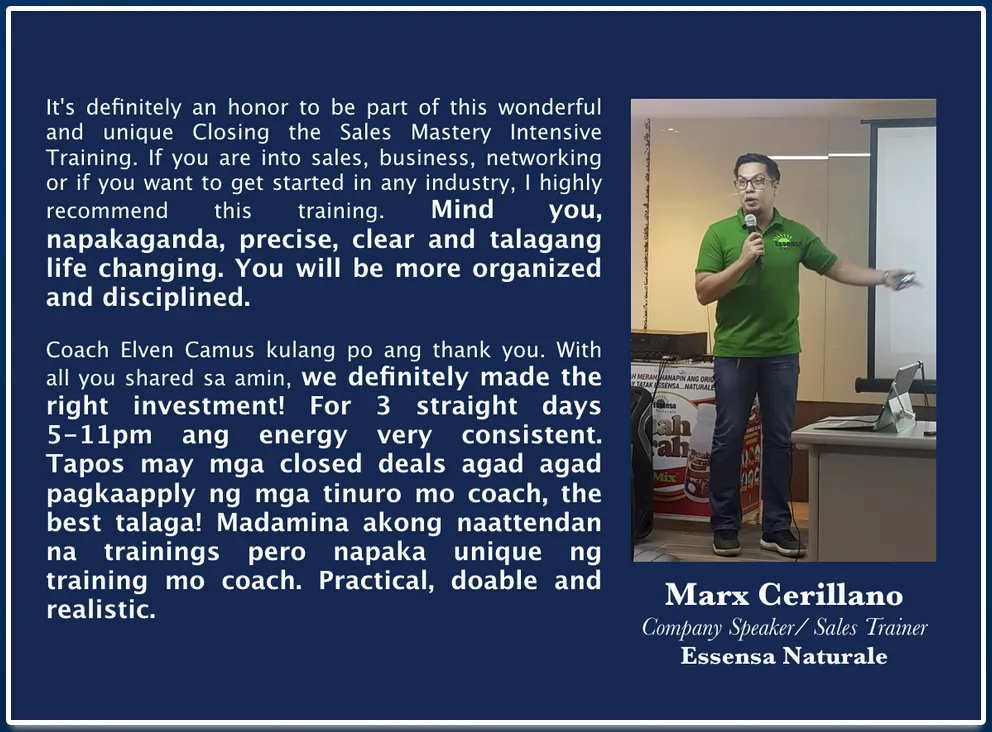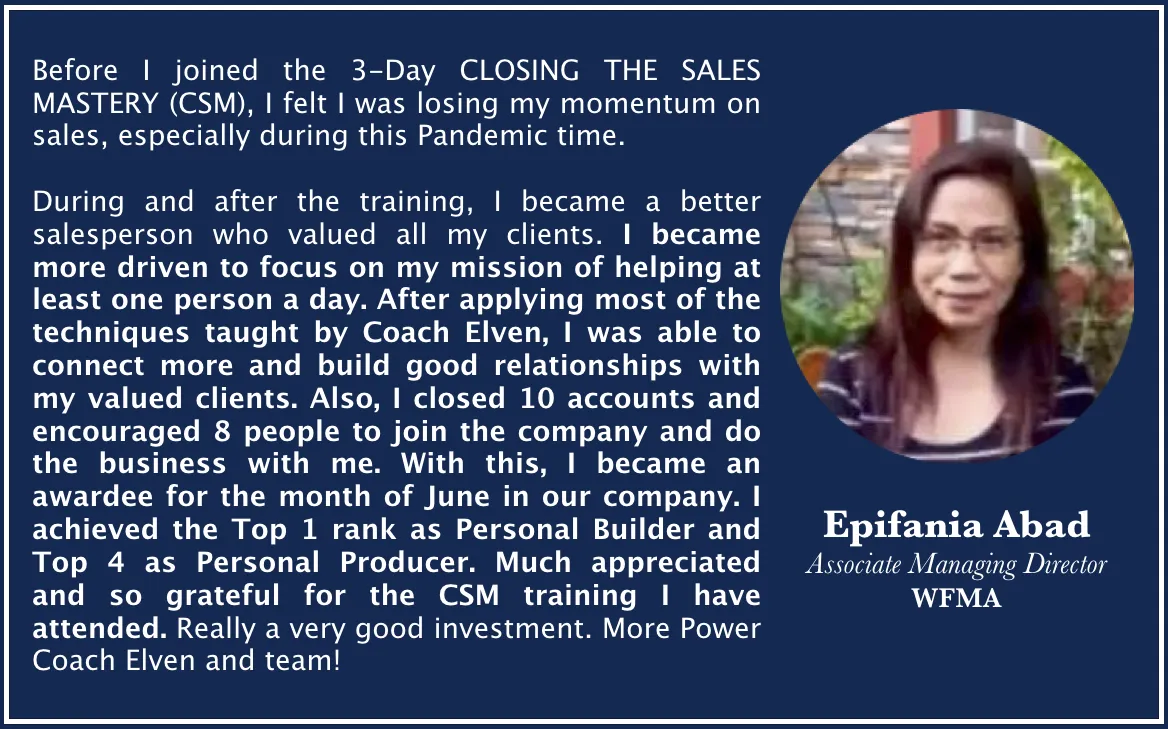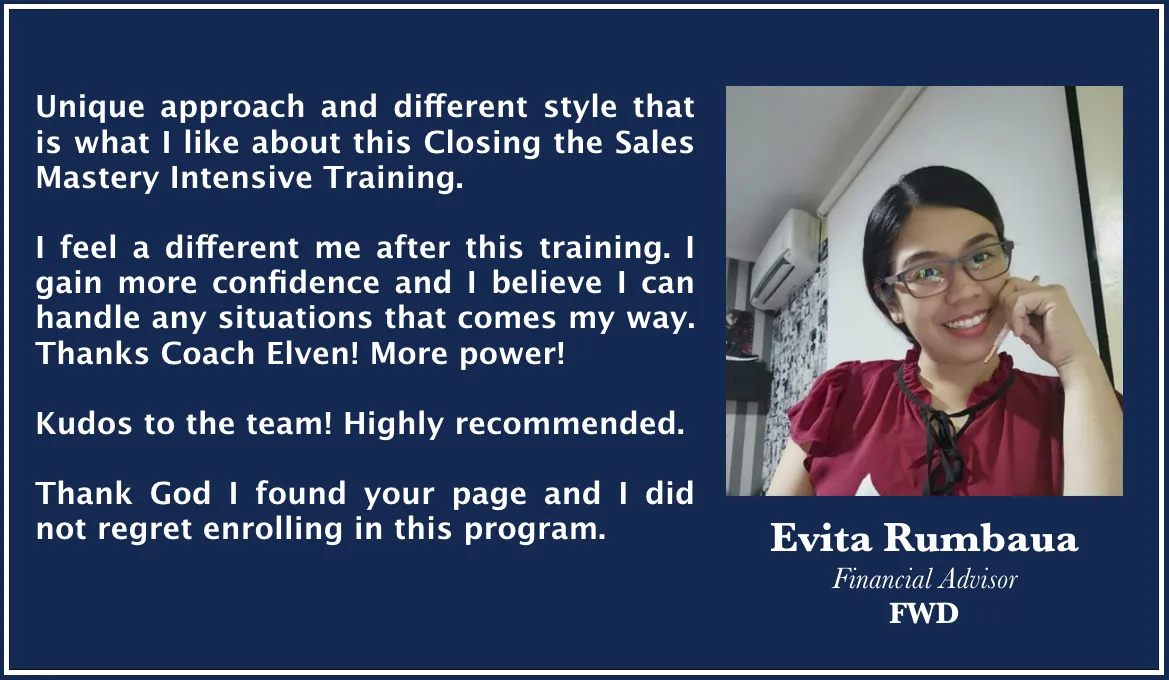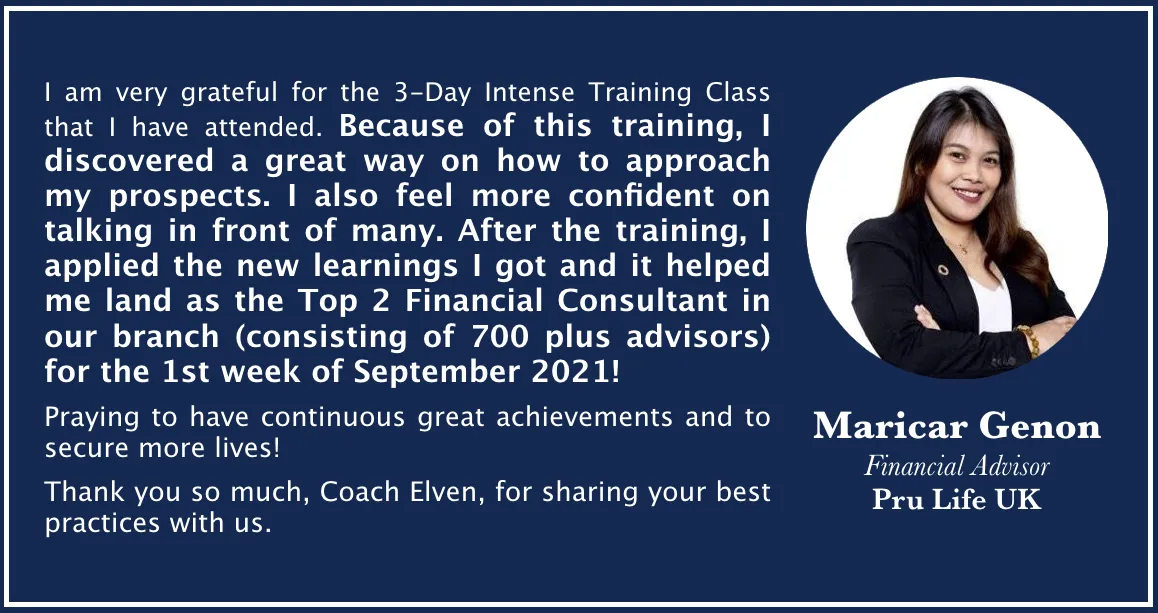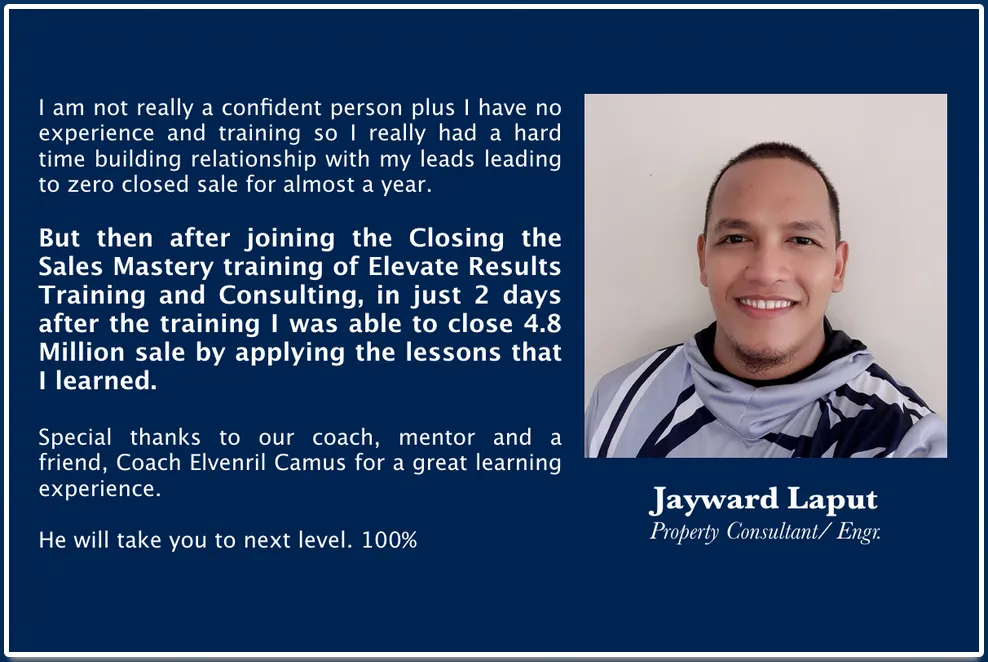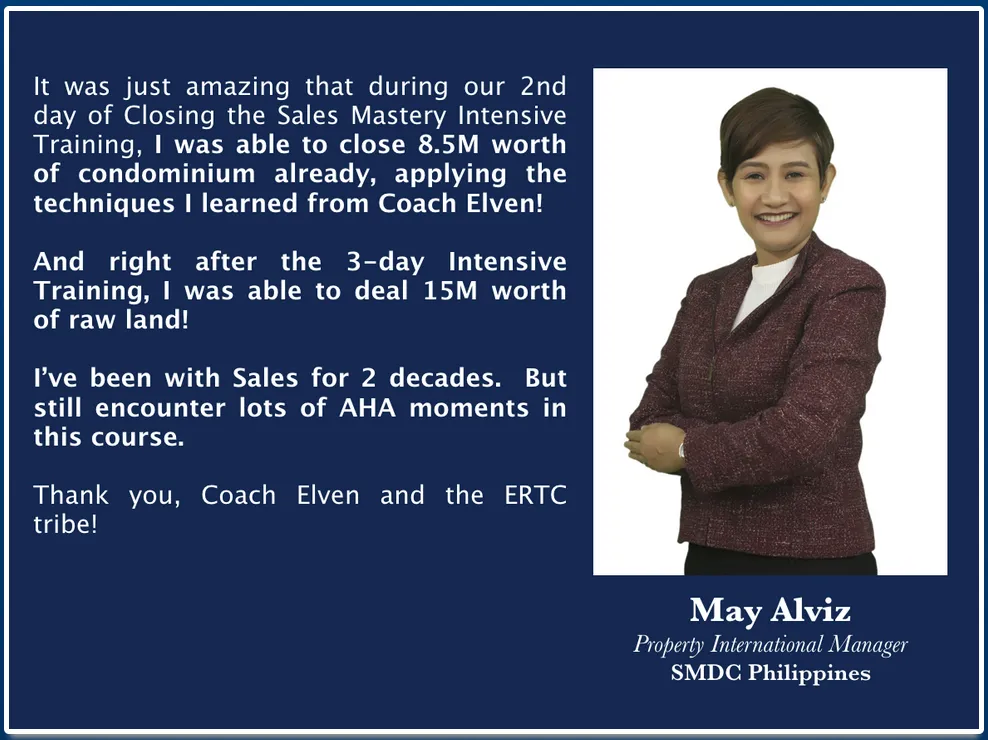
ARE YOU READY TO TRANSFORM YOUR SALES CAREER?
Discover How to Double Your Sales in 3 Months or Less!
CLOSING THE SALES MASTERY
(PREVIEW TRAINING)
SUNDAY, JULY 28, 2024
7:00 PM - 9:00 PM
What Distinguishes the Exceptional Sales Professionals and Set them Apart as Top Performers?
Click the button below to register and unveil the strategies that will elevate your sales game!
REGISTER NOW from P3,995 to FREE!
Are You Tired of Hitting the Same Sales Roadblocks?
We know how it feels to be stuck in a sales rut.
You're putting in the hours, you're reaching out to prospects, but it just isn't clicking.
You might be wondering why, despite all your efforts, your leads aren't converting into sales.
Or perhaps you're in a competitive field like real estate or insurance, where every edge counts, but you're not sure how to stand out.
Isn't it frustrating, to feel like you're just a step away from success, yet not knowing how to bridge that gap?

What if there was a way to transform these challenges into opportunities?
Imagine having the right strategies and insights at your fingertips, strategies that could triple your leads and sales conversions.
What if the difference between where you are now and where you want to be is just the knowledge and techniques that you haven’t discovered yet?
This is your chance to gain that edge, to learn from someone who has mastered the art of sales.

Have you ever wondered if there's a more effective way to skyrocket your sales? The answer lies in understanding the core principles of sales mastery.
And this is exactly what we bring to you with the 'Closing the Sales Mastery (Preview Training)' webinar.
Our unique approach focuses on three critical areas: Profiling, Marketing, and the Sales Cycle. These aren’t just any strategies; they are the backbone of successful sales in any high-stakes industry.
By mastering these elements, you'll unlock a new realm of sales potential.
Consider this: Studies have shown that a well-rounded understanding of client profiles can lead to a 60% increase in lead conversion rates.
Our webinar dives deep into these aspects, providing you with actionable insights and real-world applications.
We've seen attendees from various fields, from real estate to network marketing transform their approach and achieve remarkable results. Their success stories are a testament to the effectiveness of our tailored training approach.
Now, you stand at a pivotal moment. Are you ready to be part of this transformative journey?
Imagine where you could be after applying these groundbreaking strategies.
The path to elevating your sales skills and boosting your career is just a click away.
Don’t miss this chance to redefine your sales success. Register now for the 'Closing the Sales Mastery (Preview Training)' and start your journey towards sales excellence.
Your future in sales awaits!
REGISTER NOW from P3,995 to FREE!
The Journey to 'Closing the Sales Mastery'
Behind every great solution is a story of inspiration and purpose. For Coach Elven, the creation of 'Closing the Sales Mastery' was more than just developing a program; it was about igniting a change in the sales industry.
About the Lead Trainer
Elvenril Camus, founder and CEO of Elevate Results Training and Consulting, is a distinguished sales trainer from Cagayan de Oro City, Mindanao, Philippines. Growing up in poverty, Elven's drive to improve his family's life propelled him to excel in his career. Starting as a hotel room attendant, he quickly rose to front desk officer, earning numerous recognitions.
At 25, Elven joined an immigration consultancy firm, where he initially struggled in sales. With mentorship and dedication, he became the top sales producer for 5 consecutive years, earning Employee of the Year and Hall of Fame awards. By 30, Elven had earned his first million and began training his team.
Committed to continuous learning, Elven completed T. Harv Eker’s Signature Programs and became a certified trainer under Blair Singer Training Academy. He attended and served at major international seminars, including the National Achievers Congress and Millionaire Mind Intensive. In 2023, he was recognized as the first Filipino world-class trainer of Millionaire Mind Intensive through Success Resources.
Elven has conducted over 3,000 public migration orientations and 800 sales trainings for various companies, and has helped more than 40 thousand sales professionals and business owners enhance their sales skills. His mission is to inspire and bring positive change to others, emphasizing the importance of self-improvement, dedication, and putting God first in all endeavors.

Coach Elven Camus
Builder of Sales Champions in the Philippines
Ready to Step into a World of Advanced Sales Mastery?
This webinar isn’t just a training session; it's the culmination of Coach Elven's experience, insights, and dedication to sales excellence. It's an opportunity for you to benefit from his expertise and leapfrog the common hurdles in your sales career.Join us in 'Closing the Sales Mastery (Preview Training)' and experience the transformation that Coach Elven has designed for ambitious sales professionals like you. Your path to becoming a top sales performer is just a decision away.
REGISTER NOW from P3,995 to FREE!
At Closing the Sales Mastery, you will learn:
Building Credibility
Want to be seen as the go-to expert in your field? Even if you’re shy, introverted, or a beginner, discover how to build and showcase your credibility effectively. Stand out in your industry and become the trusted advisor your clients turn to.
Easily Setting Appointments
Struggling to get clients to commit to appointments? Discover techniques to effortlessly set meetings that highlight your offer’s value, provide peace of mind, and convincingly show why they should invest now. Turn potential clients into committed appointments with ease.
Effortlessly Handling Inquiries
Have you ever found yourself wasting precious time on inquiries that lead nowhere? Learn how to quickly distinguish serious buyers, investors, and genuine clients from spies, competitors, or time-wasters, ensuring that your efforts are focused on those who truly matter.
Effectively Presenting Products and Services
Struggling to showcase your products or services compellingly? Learn techniques to present effectively, highlighting key benefits and unique selling points. Make your offers irresistible, leaving potential clients eager to buy.
Mastering Objections
Do objections frequently derail your sales pitch? Learn proven formulas to handle objections confidently, boosting your closing ratio and increasing sales. Say goodbye to memorizing scripts and hello to natural, persuasive conversations that convert.
Successfully Setting Follow-up Agreements
Ever been ignored after a promising first meeting? Master the art of follow-up to ensure you’re not forgotten. Secure solid commitments by understanding the best strategies to keep your prospects engaged and eager to proceed.
Closing Sales Effectively
Struggling to close deals? Learn effective closing techniques that turn prospects into clients. Increase your conversion rate and boost your sales performance, sealing the deal with confidence and skill.
Building Strong Relationships
Need clients who not only choose you but also recommend you? Learn to build strong, lasting relationships that encourage clients to refer you to their networks. Create a loyal client base that helps your business grow through word-of-mouth referrals.
Effectively Getting Referrals
Finding it hard to get referrals? Discover proven strategies to encourage satisfied clients to refer you to others. Build a steady stream of new business through strong word-of-mouth recommendations.
Recruiting Team Members
Looking to expand your team but don’t know where to start? Learn how to recruit top talent and create a dynamic, high-performing team. Expand your impact and build a supportive, driven network that shares your mission and vision.
Increasing Team Productivity
Is your team’s productivity lacking? Discover methods to foster a motivated, positive work environment. Boost your team’s efficiency and watch as their performance reaches new heights, driving your business success.
HEAR FROM OUR VALUED CLIENTS

